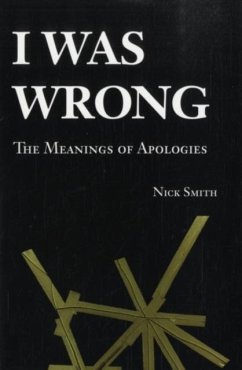Apologies can be profoundly meaningful, yet many gestures of contrition - especially those in legal contexts - appear hollow and even deceptive. Discussing numerous examples from ancient and recent history, I Was Wrong argues that we suffer from considerable confusion about the moral meanings and social functions of these complex interactions. Rather than asking whether a speech act 'is or is not' an apology, Smith offers a highly nuanced theory of apologetic meaning. Smith leads us though a series of rich philosophical and interdisciplinary questions, explaining how apologies have evolved from a confluence of diverse cultural and religious practices that do not translate easily into secular discourse or gender stereotypes. After classifying several varieties of apologies between individuals, Smith turns to apologies from collectives. Although apologies from corporations, governments, and other groups can be quite meaningful in certain respects, we should be suspicious of those that supplant apologies from individual wrongdoers.
Dieser Download kann aus rechtlichen Gründen nur mit Rechnungsadresse in A, B, BG, CY, CZ, D, DK, EW, E, FIN, F, GR, HR, H, IRL, I, LT, L, LR, M, NL, PL, P, R, S, SLO, SK ausgeliefert werden.









